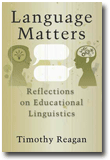
Language Matters
Reflections on Educational Linguistics
By:
Timothy Reagan, University of Maine and University of the Free State
A volume in the series: Contemporary Language Education. Editor(s): Terry Osborn, University of South Florida.
Published 2009
"This book addresses a timely and very important topic: language in education. Language, apparently, is a very tricky business. On the one hand, everyone uses language, and virtually everyone has strong views about language. In the educational domain this seems to be especially true. Language is not merely an intrinsic component of the educational process as the medium of instruction in the classroom, but also serves as the mediator of social reality for students and teachers alike. It plays a central role in articulating and conveying not only social, cultural and empirical ideas, but ideological concepts as well. It is also used to make judgments about the speaker, not to mention its role in maintaining differential power relations. And yet, in spite of this, the role of language is not sufficiently recognized in classroom practice much of the time. Nor is language, except in fairly narrow ways, really an especially central part of the curriculum, in spite of its incredible importance. To be sure, we do spend a great deal of time and money attempting to teach students to read and write (that is, to provide them with basic literacy skills), and we provide nominal support for foreign language education programs. We also provide limited support for children coming to school who do not speak English. What we do not do, though, is to recognize the absolute centrality of language knowledge and language use for the educated person. This book seeks to address these issues from the broad perspective of critical pedagogy.
CONTENTS
Preface. 1 The Reality of Language: Positivism and the Objectification of Language. 2 The Legitimacy of Language: A Critique of Linguistic Legitimacy. 3 The Learning of Language: Epistemology and Metaphorical Models for Language Learning. 4 The Teaching of Language: The Case of Foreign Language Education in the United States. 5 Paideia Redux: The Case for the Classical Languages in U.S. Schools. 6 The Challenge of Language Minorities: Linguistic Diversity and the School. 7 The Construction of Language: Interlinguistics and the Case of Esperanto as an International Auxiliary Language. 8 Language Planning and Language Policy: National and International Perspectives. 9 Language Matters: Some Concluding Thoughts. Appendix: The Sixteen Rules of Esperanto. Bibliography
REVIEWS
"Reagan's overriding theme is that language may be misused by individuals, groups, and governments, and educators must guard against such abuse. This informative volume should be required reading for everyone in a foreign-language curriculumn because it contains information that all future foreign-language educators should recognize as part of a well-formed curriculum." Frank Nuessel in Language Problems and Language Planning
-
Paperback978-1-60752-060-3
Web price: $45.04 (Reg. 52.99)
-
Hardcover978-1-60752-061-0
Web price: $80.74 (Reg. 94.99)
- eBook9781607521891

- LAN009000 - LANGUAGE ARTS & DISCIPLINES: LINGUISTICS: General
- EDU015000 - EDUCATION: Higher
- EDU037000 - EDUCATION: Research
-
 Democracy and World Language Education
Toward a Transformation
Democracy and World Language Education
Toward a Transformation
-
 How We Take Action
Social Justice in PK-16 Language Classrooms
How We Take Action
Social Justice in PK-16 Language Classrooms
-
 Intercultural Competence in Instructed Language Learning
Bridging Theory and Practice
Intercultural Competence in Instructed Language Learning
Bridging Theory and Practice
-
 Researching edTPA Promises and Problems
Perspectives from English as an Additional Language, English Language Arts, and World Language Teacher Education
Researching edTPA Promises and Problems
Perspectives from English as an Additional Language, English Language Arts, and World Language Teacher Education
-
 Starting Points in Critical Language Pedagogy
Starting Points in Critical Language Pedagogy
-
 The Seal of Biliteracy
Case Studies and Considerations for Policy Implementation
The Seal of Biliteracy
Case Studies and Considerations for Policy Implementation
-
 Understanding the World Language edTPA
Research‐Based Policy and Practice
Understanding the World Language edTPA
Research‐Based Policy and Practice

